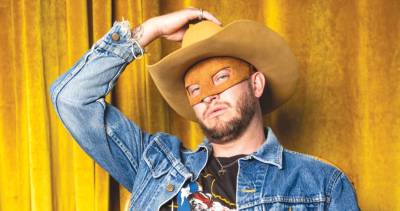National Aboriginal Day 2017: Elle-Máijá Tailfeathers builds relationships of reciprocity through film
Living in Vancouver and hailing from the Kainai First Nation in southern Alberta, Elle-Máijá Tailfeathers has seen two different sides of Canada’s fentanyl crisis.
Among many ongoing projects, the award-winning actor, filmmaker, and director is in the midst of making a feature-length documentary that will tell the story of her home community’s response to fentanyl, which first emerged in the area in 2014.
While the addiction crisis on the Kainai Nation’s Blood reserve has seemingly “become the new norm”, her film will focus on how its residents plan to move forward.
“I’ve been spending a lot of time there, but also learning about the frontlines of harm reduction here in Vancouver,” Tailfeathers tells the Straight during a telephone interview.
By bringing women from her reserve to the Downtown Eastside and visiting a number of Portland Hotel Society sites together, Tailfeathers and her accompanying team have learned firsthand how the crisis is being handled locally. She admits it’s “been a steep learning curve”.
The documentary also serves as an opportunity for her to give back: in addition to the feature, which she hopes to release next spring, she’s produced a series of short films that are being used as teaching tools. Providing them is just one way she hopes to honour the relationship of reciprocity that she has with the community, which is collectively helping her to complete the film.
As an indigenous woman in the film industry, Tailfeathers says her artistic choices are largely dictated by a responsibility she feels to that community, to do work that she calls both “meaningful and generative”.
“I consistently find myself doing work that is rooted in social justice,” she says.
While she tackles such issues in her work fearlessly, dealing with them within the bounds of the film industry can present a much more difficult task.
For Tailfeathers, issues of inequality in the world of film are simply representative of systemic issues that exist across the country.
“Social inequalities in regard to race, class, gender, sexuality, and disability are pervasive in this nation. If we want to see change, we must challenge the systems of power that uphold and benefit from those inequalities,” she says. “Pragmatically, that means privileging the voices of the marginalized, and de-centring the voices of the privileged.”
It’s why she finds another project she’s working on—a narrative feature she is cowriting and directing with Leo Award winner Kathleen Hepburn—so powerful.
“Women face so many barriers, and time and time again we see that women are often working behind the scenes, doing so much politicized work to essentially challenge those inequalities,” she says. “It’s work like this that I think can really make a difference.”
Next Wednesday (June 21) is National Aboriginal Day. This will be celebrated in Vancouver with a free festival at Trout Lake in John Hendry Park running from 9 a.m. to 10 p.m.















Comments